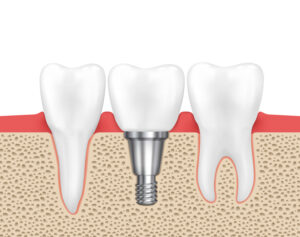 Dental implants have been offered in recent years as a panacea for fixing the problem of ailing teeth. However, the reality when it comes to treating a badly injured or infected tooth is more complex. Both endodontic procedures such as root canals and dental implants have their proper place – your dental care team can help determine what treatment will be most effective for you.
Dental implants have been offered in recent years as a panacea for fixing the problem of ailing teeth. However, the reality when it comes to treating a badly injured or infected tooth is more complex. Both endodontic procedures such as root canals and dental implants have their proper place – your dental care team can help determine what treatment will be most effective for you.
Here are four common myths related to dental implants, and the factual situation in each case.
Myths related to dental implants and root canal treatments
Myth #1: The best thing to do in all cases with an injured or infected tooth is to replace it with a dental implant.
There are a range of factors that will determine if a dental implant or a root canal is the best way to proceed. Although dental implants would appear at first glance to permanently resolve the issue with a troubled tooth, they can also cost more and require more visits to the dentist to complete. Most root canal treatments, which remove inflamed pulp and clean, fill and seal the inside of the tooth, can be accomplished in a single visit and are virtually painless.
Myth #2: Dental implants have a higher success rate than root canals.
A number of studies have shown both dental implants and root canals can have success rates of more than 95 percent. Currently, both procedures are considered excellent choices for treating an ailing tooth, and decisions to go with one procedure over the other should be based on factors related to an individual’s unique situation.
Myth #3: If you have a root canal and it fails, you need to have an extraction done and a dental implant placed.
Not necessarily. Root canals can fail for reasons that include damage to the crown protecting the treated tooth, additional tooth decay, or hidden canals that were not properly cleaned and filled the first time. However, endodontic retreatments of root canals can successfully restore the natural tooth to health in as many as 75% – 88% of all cases.
Myth #4: Your endodontist can’t help you if you need an implant.
Actually, the American Association of Endodontists has released a position statement affirming that if a endodontist determines a tooth must be extracted and a dental implant placed, he or she may proceed with the extraction and the placement of the implant if it is in the best interest of the patient.
“The decision whether to save a natural tooth or to proceed with an extraction and dental implant can be a difficult one,” says Dr. Jacqueline S. Allen, who practices with the Phoenix Endodontic Group. “Your endodontist can help you sort through your options and make the best decision for your individual health needs.”
